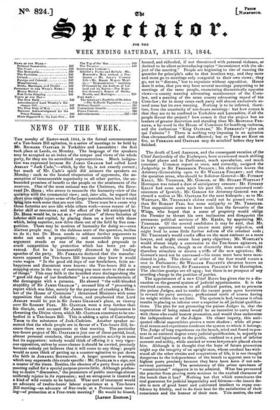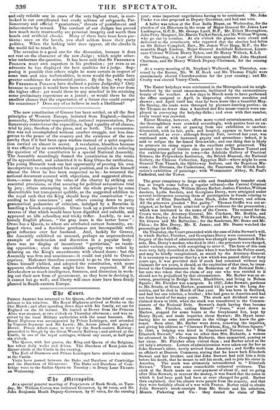The death of Lord ABINCER, and the consequent vacation of
the Chief Justiceship of the Exchequer, have occasioned much shifting in legal places and in Parliament, much speculation, and much comment. Common report at once, and correctly, assigned the Judgeship to Sir FREDERICK POLLOCK ; his elevation leaves the Attorney-Generalship open to Sir WILLIAM FOLLETT; and then the question arose, who should be Solicitor-General—Mr. Firsaor KELLY, Mr. THESIGER, Mr. GODSON, Or Mr. STUART WORTLEY ? Hereupon was raised a dust of anticipatory censure : Mr. FITZROY KELLY had some stain upon his past life, some untoward remi- niscences of Ipswich ; Mr. GODSON for Attorney-General was as absurd a notion as Mr. OASTLER for the next bishopric ; as to Mr. WORTLEY, Mr. THESIGER'S claims could not be passed over, but then Sir ROBERT PEEL has some antipathy to Mr. 'Pumices. That supposition seems to have made him the favourite of the Whigs, who hoped that a sense of propriety would oblige the Premier to thwart his own inclination and disappoint the strenuous political services of Mr. Kuria', by appointing Mi. THESIGER. Of the several candidates it may be said, that Mr. Kerxis appointment would create most party objection, and might lead to some little further reform of the criminal code; Mr. THESIGER'S would confer office on the most eminent as a mere lawyer, and might create least party objection; Mr. Woarties would almost imply a concession to the Ten-hours agitators, to whom he adheres, though in.ire discreetly than some—it might therefore stimulate or disarm a trifle of the new agitation ; Mr. GODSON'S need not be canvassed—his name mtist have been med- tioned in joke. The choice of either of the four would vacate a seat in Parliament ; Sir WILLIAM Foerires elevation leaves an empty seat for Exeter, Sir FREDERICK POLLOCK'S for Huntingdon. The election-gossips are all agog ; but there is no prospect of any startling change in the position of parties.
The appointment of a new Chief Baron has given rise to a dis- cussion on the general system of judicial appointments. It is the received custom, common to all political parties, not to promote the puisne Judges, and to confer the vacant posts upon barristers in reward for party services; professional merit of course having its weight within the set limit. The system is bad, because it often results in placing an inferior over a superior in all judicial qualifica- tions. The plea for not promoting the puisne Judges is, that the expectation of being raised would be an incentive to curry favour with those who could bestow promotion, and would thus undermine the independence of the Judges. On closer inquiry, this anti- quoted official superstition proves a mere shadow ; while all prac- tical reason and experience condemn the system to which it belongs. The Judge of long experience on the bench, tried and found to pos- sess in an eminent degree every judicial qualification, is, unjustly to hiaiself and injuriously to the public, confined to a post of inferior account and utility, while untried or worse lawyers are placed above him. Although it is thought that the hope of future promotion might sap the integrity of an upright man, whose conduct has with- stood all the other strains and temptations of life, it is not thought dangerous to the independence of the bench to appoint men to its highest posts precisely because they have been keen if not sub- servient partisans ! The oonsistency of this prime specimen of "constitutional" etiquette is to be admired. What has prevented the practice from proving more noxious to the exalted character of the bench than it has ? Nothing but that which constitutes the real guarantee for judicial impartiality and fairness—the innate de- sire in men of good heart and cultivated intellect to repay con- fidence by fidelity, and to do their best for the satisfactioc of their conscience and the honour of their race. This motive, the real and only reliable one in cases of the very highest trust, is over- looked in our complicated but crude scheme of safeguards, Par- liamentary and official "guarantees," threats of punishment and inducements by reward. The conduct of our Judges has proved how much more trustworthy are personal integrity and worth than bonds and artificial checks. Many of them have been keen par- tisans: once on the bench, you shall seldom know their party politics. When the lurking taint does appear, all the checks in the world fail to touch it.
The occasion is a good one for the discussion, because it does not rest on the character of the new Judge ; which might other- wise embarrass the question. It has been said that Sir FREDERICK POLLOCK must own superiors in his profession ; yet even as an advocate he has displayed the best qualities for a judge. Sup- posing it possible that others might be more certain in respect of some rare and nice technicalities, in none would the public have greater confidence for substantial justice. By the by, why would Er FREDERICK POLLOCK have declined a puisne Judgeship ? Only because to accept it would have been to exclude him for ever from the higher office : yet would there be any mischief in his attaining some preliminary experience as a junior ; or would there be the smallest chance that the expectation of a future rise could corrupt his conscience ? Does any of us believe in such a likelihood?



























